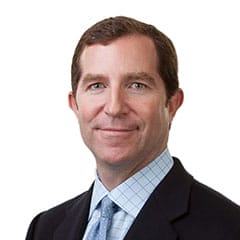David Mussafer’s path to private equity wasn’t a clear one. After graduating with honors from Tulane University, Mussafer, WG’90, worked on Wall Street at Chemical Bank. The late 1980s were early days of the buyout business, and he saw many deals first-hand on the lending side. By the time he attended Wharton, he knew what he wanted to do for a living; it was a matter of how, through a startup or established firm. Then a ground-floor opportunity opened in 1990: venture capital firm Advent sought to get into buyouts. Since, Advent has become a global buyout player with a focus on five industries: business and financial services, health care, tech, industrial and consumer/retail.
WHARTON MAGAZINE: How did you go from Wharton to PE?
DAVID MUSSAFER: At the time, it was early days in the buyout business, and I was looking to start my own little investment group while I was at Wharton. I actually went down an unusual path: I didn’t interview for jobs during my second year of school. Instead, I tried to hustle up my own buyout deal roughly patterned after what I had read in a case study called the Jim Southern case. While I received a few offers to interview, I avoided interviews because I was afraid I might accidentally land a job. It sounds silly now, but I thought then, how would I explain to my parents, or myself, how I could afford not to take an offer while still knee-deep in student loans. So graduation came and went in May 1990, and I continued as an unemployed, would-be dealmaker in Philadelphia. As luck would have it, Advent, via a former colleague from a prior summer job at Adler & Shaykin, came knocking a few months later.
WM: What’s a highlight from your Advent career?
MUSSAFER: The one that got away. A long time ago, we came close to buying a stake in Under Armour when the company was just starting.
Kevin Plank, the founder, and I had worked on this deal. For whatever reason, it didn’t work out. Besides breaking the heart of my kids,
it went on to be a tremendous success.
We began looking for companies that would also benefit from similar emerging trends on the apparel side and found Lululemon Athletica in 2005. Advent became a founding investor working with owner Chip Wilson. As an interesting epilogue, we recently re-invested in Lululemon this fall, and Advent is once again the largest shareholder together with Chip.
WM: How do you approach investing in the current climate?
MUSSAFER: We try to approach things two ways. First, we think more about the micro story for each business rather than the broader macro environment. We are only looking for several (five to seven) great companies to invest in each year all over the globe. It’s a seller’s market today, and there are lots of great companies currently for sale.
The second element of our strategy today is to focus on investments where we believe we can meaningfully improve the operational performance of our companies.
One of the lessons we learned from the last cycle is to never forget that there’s a difference between a great company and a great investment; they aren’t the same. This is hard work, but if done well, it allows us to really move the needle on our performance.
WM: Given Advent’s international approach, what do you see as the biggest challenges ahead?
MUSSAFER: With offices in 13 countries, our biggest international challenge is to make sure everyone is on the same page. We have to make sure financial incentives for our investment pros are aligned with our goals for the funds. Over the past 30 years, we’ve invested in 40 different countries.
It’s important that the investment pros worldwide continue to collaborate effectively to make sure that we ultimately pursue the very best opportunities for our funds.
WM: What’s your approach to serving on the board of a portfolio company?
MUSSAFER: The board will meet five or six times a year, but a lot of the important work occurs outside of the formal board meeting as we collaborate with management to prioritize the company’s major initiatives. The most powerful impact that we can make is to align the ownership with the management and the board so that we’re all focused on a shared vision for success.
Read the other “Pride of Private Equity” alumni profiles, as well as watch the video interviews with student leaders, here.

























